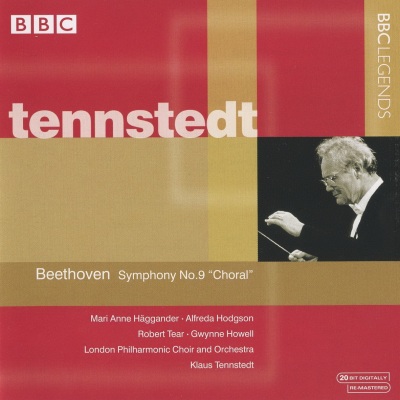
Beethoven: Symphony No.9 "Choral"
I well remember hearing this performance over the radio as it happened and being impressed by it then. A friend who was present at the Albert Hall rang me immediately after it was over to tell me how amazing it was live. And here it is, available to all. Tennstedt was a remarkable conductor, and never less so than when caught live, as this disc amply demonstrates. His rapport with the London Philharmonic was a miracle of its time and it is fully in evidence here. This Ninth is a far cry from the recent Norrington on Hänssler . Under Tennstedt, the opening takes on an elemental, massive quality – here is the Ur-Welt of the beginning of Rheingold in embryo. This is a statement of the utmost integrity, an unfolding of organic growth that is entirely true to the spirit of Beethoven. Tennstedt and his players find astonishing energy inherent in the harmonies, the orchestra working as one towards its conductor’s vision. The ‘live’ element, so visceral in evoking the tension of the first movement, reveals less than water-tight ensemble on several occasions in the ‘Molto vivace’ (and it is ‘molto’). True, some detail gets lost in the acoustic, but there is no doubting the spirit. Tennstedt takes some 17 minutes over the ‘Adagio molto e cantabile’ (16’51: contrast Norrington’s 12’07). With Tennstedt it becomes a gentle unfolding encompassing both grandeur and a tenderness entirely in keeping with the composer’s Third Period. Here one enters the near-static world of the slow movements of the late string quartets, and to mesmeric effect. There is almost a generosity of lyricism (and such wonderful wind playing!) that makes the contrast at the beginning of the almighty final movement all the more effective. Punchy and intimidating, this orchestral shriek makes its point despite the somewhat strange recording balance (horns, occasional split and all, shoot through the texture rather unnaturally). However one interprets the parade of themes (rejection versus angry assimilation) that characterises the music pre-‘An die Freude’ theme, the arrival of the theme itself begins a passage of natural and inevitable growth that typifies Tennstedt’s organicist approach. The mighty and powerful orchestral statement immediately preceding the tenor’s entrance is the only outcome of the (true) pianissimo cellos and double-basses at 3’. The soloists are mixed. Howell is fine if not overly authoritative, and Tear is Tear (overly dramatic and wobbly). Mari Anne Häggander’s glowing high register is particularly worthy of note. Soloists are also very closely-miked, leading to a rather distorted sound-stage. Interpretatively, however, the performance can hardly be faulted – perhaps the importance of the line ‘Über sternen muss er wohnen’ is slightly underplayed, but there is no doubt whatsoever that the rousing cheer from the Prommers is, for once, thoroughly deserved. -- Colin Clarke, musicweb-international.com
